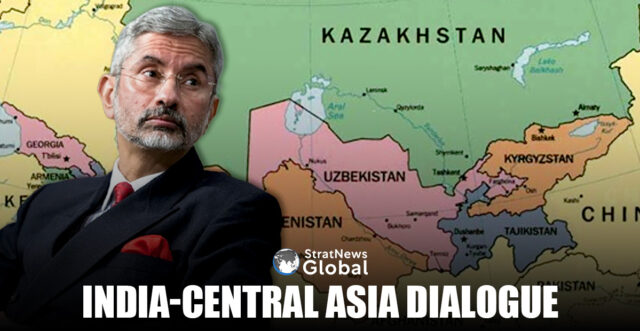The foreign ministers of five Central Asian nations are reaching India for the fourth India–Central Asia Foreign Ministers’ Meeting on June 5–6 in New Delhi.
The conference to be hosted by India marks a significant diplomatic engagement aimed at strengthening cooperation in security, energy, trade and connectivity—with renewed emphasis on counterterrorism and regional stability.
This year’s meeting gains added urgency after Operation Sindoor, India’s recent military response to cross-border terror attacks. It also comes amid rising extremist threats in the Af-Pak region that have reverberated across Central Asia.
Who’s Attending?
Top diplomats from the five Central Asian republics—Kazakhstan, Kyrgyzstan, Tajikistan, Turkmenistan, and Uzbekistan—will attend in person, including Murat Nurtleu, Deputy Prime Minister and Foreign Minister of Kazakhstan; Zheenbek Kulubaev, Foreign Minister of Kyrgyzstan; Sirojiddin Muhriddin, Foreign Minister of Tajikistan; Rashid Meredov, Deputy Chairman of the Cabinet of Ministers and Foreign Minister of Turkmenistan; and Saidov Bakhtiyor Odilovich, Foreign Minister of Uzbekistan.
India will be represented by External Affairs Minister S Jaishankar, who is scheduled to deliver the keynote address at the India–Central Asia Business Council on June 5, alongside his Central Asian counterparts.
Focus Areas Of The Dialogue
This year’s meeting will address several pressing priorities:
- Counterterrorism and Deradicalization: In the wake of the Pahalgam attack in India and ongoing concerns about the resurgence of extremist groups in Afghanistan and Pakistan, regional security will top the agenda. The ministers are expected to explore mechanisms for intelligence sharing, border security collaboration, and counter-radicalization strategies.
- Energy and Resource Cooperation: Central Asia’s vast reserves of gas, oil, and minerals offer strategic value for India’s growing energy needs. Discussions will include proposals for joint ventures, renewable energy cooperation, and long-term energy supply agreements.
- Connectivity and Trade Corridors: High on the agenda is enhancing trade via the International North-South Transport Corridor (INSTC) and the Chabahar Port. Countries including Uzbekistan, Kazakhstan and Turkmenistan, have begun using these routes to ship consignments to India. Greater transport and digital integration will be explored to ease customs, reduce transit time, and expand markets.
- Climate and Environmental Cooperation: As climate threats intensify in both South and Central Asia, the ministers are also expected to discuss joint action on climate adaptation, water resource management and desertification—areas of shared vulnerability.
- Cultural and Educational Exchanges: Building on India’s historical links with Central Asia, the agenda includes academic collaborations, scholarship programmes and cultural diplomacy.
India–Central Asia Business Forum
Running alongside the ministerial dialogue is the India–Central Asia Business Forum on June 5, co-hosted by the Federation of Indian Chambers of Commerce and Industry (FICCI) and the Ministry of External Affairs. Launched in 2020, the forum has evolved into a crucial platform for driving trade and investment partnerships.
The forum underscores India’s efforts to complement its strategic diplomacy with robust economic engagement, especially in sectors where Central Asia seeks diversification beyond traditional partners like Russia and China.
Timely Geopolitical Engagement
India’s strategic outreach to Central Asia comes at a time when the region is navigating complex pressures—including security vacuum in Afghanistan, growing Chinese economic influence and increasing Russian dependency.
By positioning itself as a reliable, democratic and development-oriented partner, India hopes to deepen its presence in a region rich in resources and geopolitical importance.
The talks will also help New Delhi reinforce multilateral support in the aftermath of Operation Sindoor, signalling to the global community its commitment to targeted counter-terror action while engaging constructively with neighbours.





